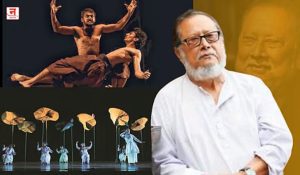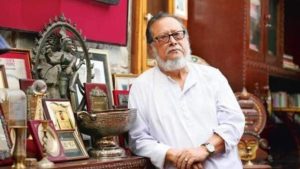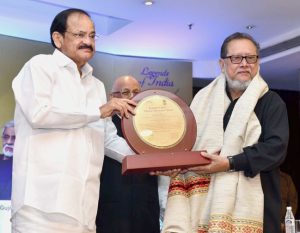Final Curtain Call For Ratan Thiyam

A renowned Indian playwright, theatre director, and dramatist, Padma Shri Ratan Thiyam passed away recently, he was known for his innovative contributions to contemporary Indian theatre. Born in Manipur in 1948, he was a leading figure in the “theatre of roots” movement, which blends traditional Indian performance styles with modern themes. Thiyam was the founder of the Chorus Repertory Theatre in Imphal, which gained international acclaim. A graduate of the National School of Drama, his works are deeply philosophical and rooted in Indian culture and mythology.
The world of art and culture mourned his death after a prolonged illness. Cultural Icon of India Padma Vibhushan Dr. Sonal Mansingh who worked with him said, “Ratan Thiyam entered the theatre world like a meteor, changed the usual style of drama production & presented an integrated approach of Natya. He brought Manipur’s dance & music into focus. I was fortunate to have his guidance while reworking on my landmark solo dance-theatre Draupadi in 1994-95. I offer my condolences to the family & pray for his soul to attain Natyalok.”
Dr. Sandhya Purecha, Chairperson Sangeet Natak Akademy (SNA) said, “We have lost a true luminary and guiding light, a revolutionary artist and visionary who transformed the landscape of Indian dramatic arts. Shri Ratan Thiyam’s contributions and his devotion both are immortal and he lives on through his extraordinary works. My most sincere condolences to his family and loved ones. An institutional architect and creative visionary, the SNA is indebted to him for his guidance and leadership during his tenure as a former Vice-Chairperson. The SNA and the artist fraternity deeply mourn his passing. Om shanti.”
I had the privilege of meeting the maestro in 2013, when Dr. Mansingh introduced me to him. Since then, we shared a very warm relationship. I visited his institute twice, conducted dance Ballroom dance awareness workshops for his team, and thoroughly enjoyed his warm and caring hospitality. Below are some excerpts from my chats with him:
You have spent over five decades shaping Indian theatre. What first drew you to the performing arts?
I was born into a household where art was the air we breathed. My father, Thiyam Tarunkumar, was a writer and performer. My mother, Bilasini Devi, was rooted in Manipuri classical traditions. As a child in Imphal, music, dance, and ritual weren’t separate from daily life — they were part of our spiritual and cultural rhythm.
You trained at the National School of Drama but didn’t follow mainstream theatre. Why?
When I studied at NSD, I was deeply influenced by world drama — Greek, Japanese, European. But I realised our own soil had the richest theatrical language. That’s why I became part of the “Theatre of Roots” movement. I didn’t want Indian theatre to imitate the West. I wanted it to remember its own voice.
In 1976, you founded the Chorus Repertory Theatre. How did that change your journey?
It gave me a home. A place where I could experiment, fail, learn, and create. Chorus became a space of spiritual discipline — not just performance. We built it from scratch in Imphal. Over time, we staged works like Andha Yug, Chakravyuh, Uttar Priyadarshi, and Urubhangam. Each play was a blend of dance, martial art, music, silence, and poetry.
Your productions are known for stunning visuals and deep philosophical themes. How do you approach storytelling?
Theatre for me is not about words alone. I paint on stage — with shadow, gesture, silence. Manipuri culture teaches that art is prayer. So in my plays, music and dance aren’t decoration — they are spirit. I’ve used Thang-Ta martial art, Sankirtana, and masked dance to express what words often cannot.
You once returned your Padma Shri. Why?
In 2001, I returned the award in protest of the government’s policy on the NSCN ceasefire, which extended to Manipur without consulting its people. Art cannot be separate from conscience. I believe artists must speak when silence becomes complicity.
You have served as Director and Chairperson at the National School of Drama. What role do institutions play in preserving heritage?
Institutions must become listeners. They must listen to the folk singer in a remote village, the puppeteer in a desert, the young boy playing drums at a festival. Our intangible heritage is in danger of being forgotten. Education must connect students to their roots, not just to techniques.
What role does the Northeast play in Indian theatre?
The Northeast has always been culturally rich, yet it is often treated as peripheral. I’ve said before — the Northeast is like the gall bladder. You can remove it, and the body still functions, but something vital is lost. My work has always tried to bring the dignity and depth of Manipuri culture to national and global stages.
What is your most memorable moment on stage?
It is difficult to choose. But I remember staging Uttar Priyadarshi abroad — in Greece, Mexico, and Japan — and seeing how audiences connected deeply, despite the language barrier. That’s the power of theatre rooted in truth. Even across continents, it touches hearts.
You have received many honours, how do you view recognition?
Awards are appreciated, but they are not the goal. If a child in a remote village watches a play and feels awakened, that is my greatest reward. My purpose has been to serve — to make theatre a sacred, healing space.
What advice would you give to young artists?
Know your roots. Respect your tradition. And never forget the power of silence — sometimes it speaks louder than words. Theatre is not just performance. It is responsibility. And above all, it is love.
Lastly, how would you like to be remembered?
As someone who served art with devotion. As a storyteller who believed that every movement, every sound, every breath could become a prayer. If my work inspired even one soul to look inward and rise upward, I am content.
With folded hands, we bid farewell to a true cultural visionary. Ratan Thiyam’s light may have dimmed, but his theatre will forever echo across generations — fierce, poetic, and profoundly Indian.
Sandip Soparrkar holds a doctorate in world mythology folklore from Pacific University USA, an honorary doctorate in performing arts from the National American University, He is a World Book Record holder, a well-known Ballroom dancer and a Bollywood choreographer who has been honored with three National Excellence awards, one National Achievement Award and Dada Saheb Phalke award by the Government of India. He can be contacted on sandipsoparrkar06@gmail.com




